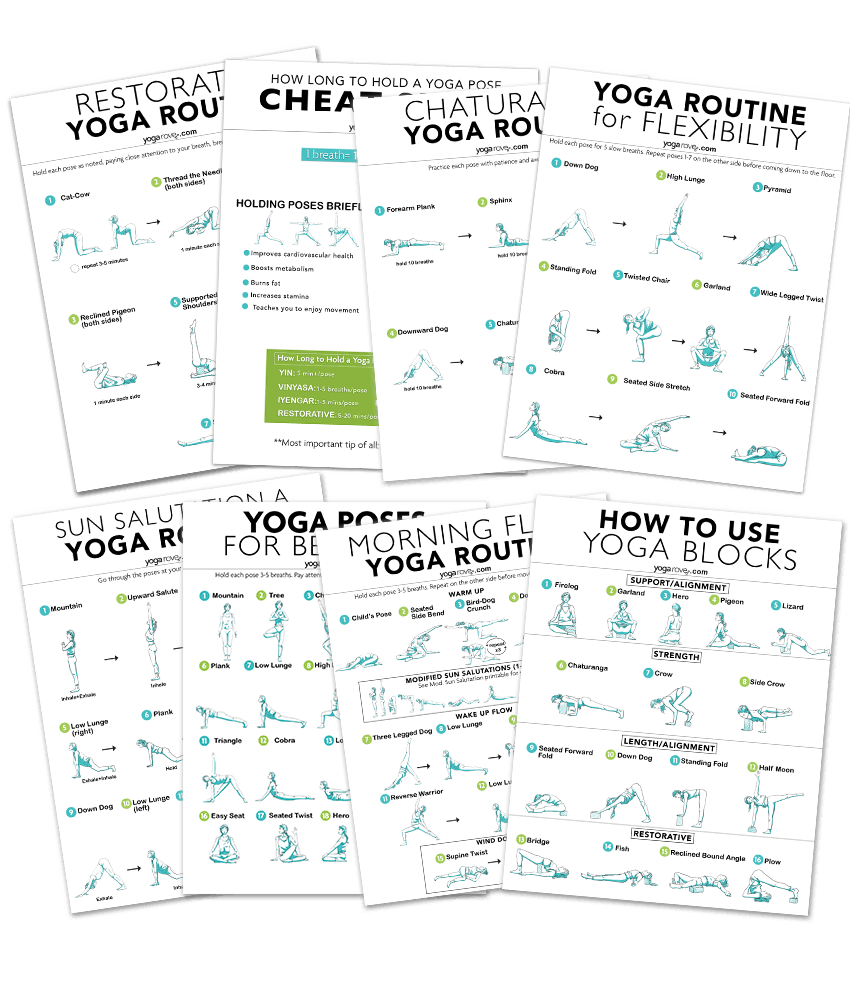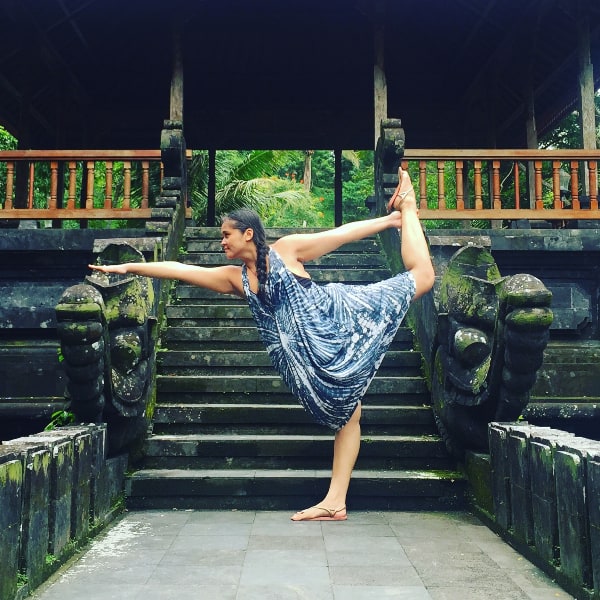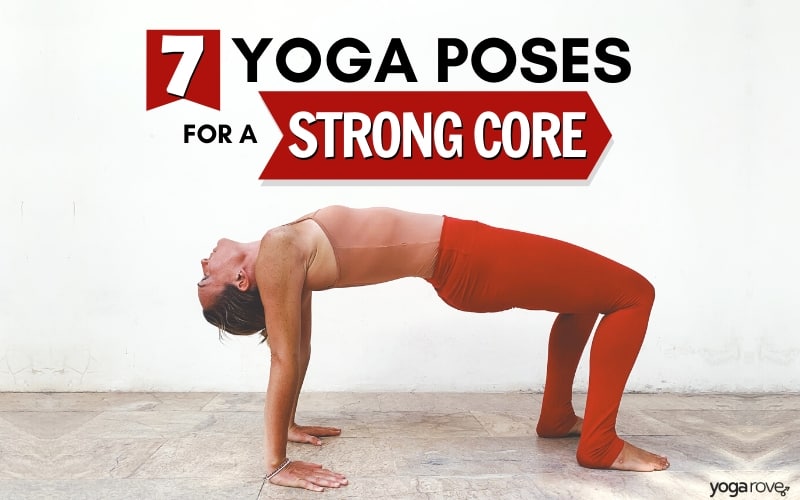This post may contain affiliate links. Please read our disclosure for more info.
Yoga is often seen as a gentle activity– it’s calming, spiritual, and can be a very gentle and relaxed practice. However, any yogi who has attended an Ashtanga or Power Vinyasa class knows that’s not always true. From arm balances to fast-paced sequences, you will definitely feel it in your body after a vigorous practice.
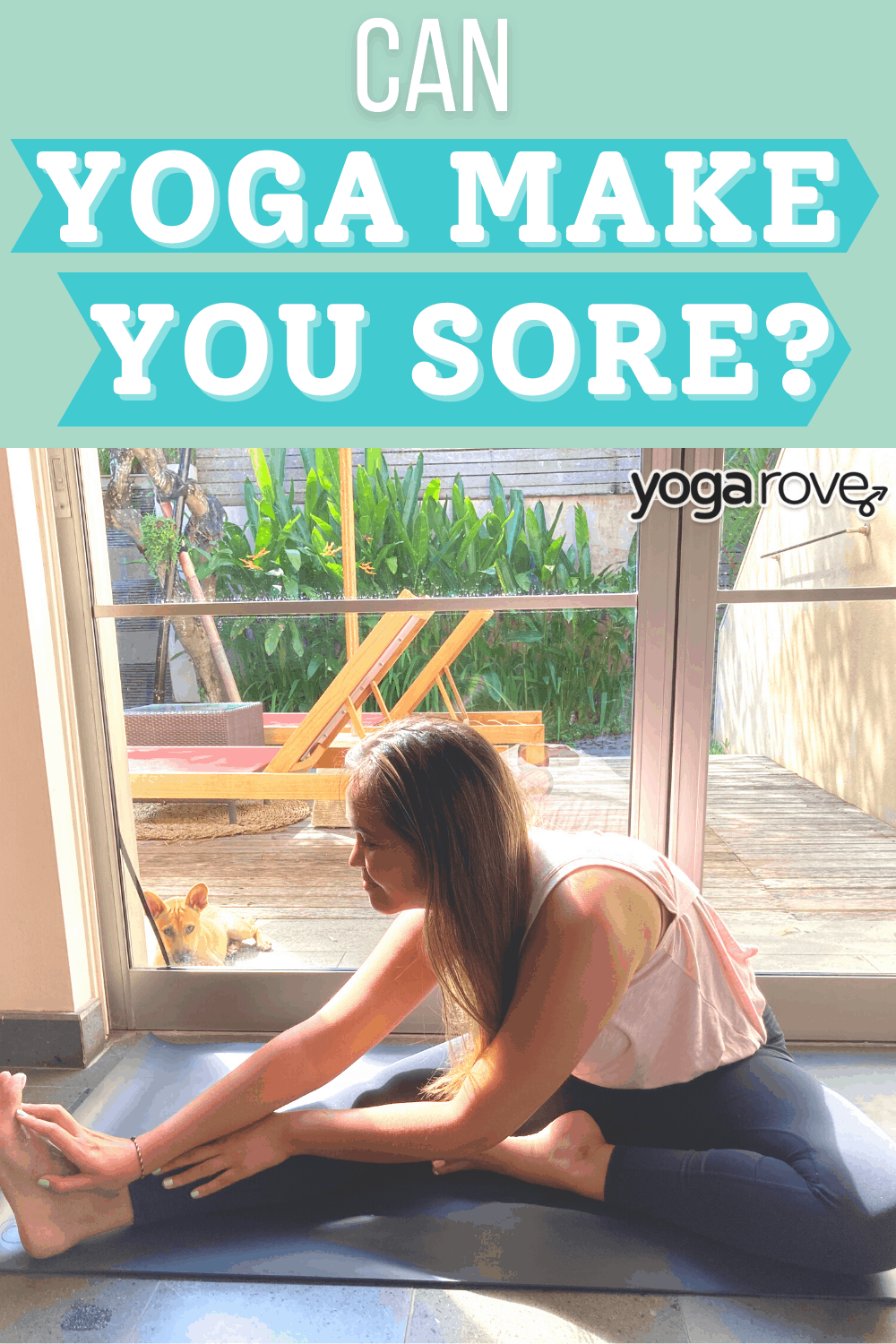
So can yoga make you sore? Definitely. If you are attending classes that are dynamic and energetic such as vinyasa, hot, or power yoga, then you can make yourself sore. After doing countless Chaturangas, planks, and core-activated poses, yoga can definitely leave you feeling sore days after your practice.
It’s common to feel sore if you haven’t been physically active, if you are using new muscles, or if you are exercising at a higher intensity level. If you haven’t practiced yoga in a while or are taking a challenging class that works with different muscle groups, you will probably feel sore the next day.
Is it Normal to Be Sore After Yoga?
It is totally normal to feel soreness or tightness in your body after your yoga practice. You can feel this way after a dynamic practice like Vinyasa, or even after a deep stretching practice like Yin. If you’re feeling sore after yoga, know that many yogis frequently feel the same.
Some people may think of yoga as a low-impact physically activity and that they shouldn’t feel sore after practice. However, using muscles that you don’t usually use will always result in soreness, even if you’re physically active in different ways.
Soreness vs Pain After Yoga
Feeling pain during and after your yoga practice is a sign that you may have pushed your body too far. You might experience slight discomfort while holding poses for a long time at first, but it is a good idea to distinguish the difference between pain and discomfort.
Generally, if you feel a sharp and stinging sensation, back off from the posture and don’t push yourself. If the feeling is a little uncomfortable or slightly duller, feel and breathe into it. Listen to your body, and come out of it if need be. As you begin to become more in touch with your body sensations, you will be able to notice the difference between a slight burn in your muscles from waking them up and going too far in your poses.
How Long Do You Stay Sore For?
Tiny tears and inflammation in your muscle occur if you haven’t used them in a while. These tears and inflammation cause muscle soreness. Even though it is not uncommon to feel sore, it may also be a sign from your body that you may need to rest or take it a little easier next time you workout or practice.
If you feel sore after your yoga practice, it will usually subside after 1-3 days. Know that it is completely normal to feel sore after your yoga class, especially if you are trying out a new pose or working new muscles in your body. While your muscles are sore, listen to your body and give yourself what you need. It might be a day of rest, a massage, or a gentle yoga practice.
Is it Okay to Do Yoga with Sore Muscles?
Even though it may feel like the last thing you want to do when you have sore muscles, a gentle and slow practice can actually be very beneficial for muscle soreness. Your muscles can become tight after an intense yoga practice, so gently stretching them can feel great in your body.
The first 10 minutes or so might feel a little unpleasant, but once your muscles start loosening up a bit, your soreness will likely subside. Try a gentle practice like Yin yoga or Restorative yoga, and allow yourself to relax, lengthen, and release your sore muscles.
Remedies for Sore Muscles
In addition to a restorative and relaxing yoga class, there are many other practices that you can do to relieve your sore muscles. Here are a few that you may want to try:
Rest
Getting eight hours of quality sleep gives your muscles time to recover. While sleeping, your muscles can rest and repair and giving an adequate amount of time to sleep while speeding up the recovery. Make sure to get a good night’s rest after an intense practice.
Nutrition
A balanced diet with all the nutrients you need is essential to muscle growth and regeneration. After your practice, eat a healthy and balanced meal. Some yogis and athletes rebuild their muscles with an increased amount of protein, so feel free to add beans, meat, tofu, eggs, and nuts to your diet. Some other foods that are said to help sore muscles include:
- Coconut water: This is the perfect post-workout drink rich in electrolytes, potassium, and magnesium
- Fish: Fish is packed with omega 3 fatty acids and a great protein to add to your diet
- Cherry juice: This juice is anti-inflammatory and can help with muscle inflammation in your body
Stretching
If you don’t have time for a full yoga practice, take a few minutes at the start or end of your day for some light stretching. Look up some stretches on Youtube based on your muscle soreness and stretch the tension away.
Hydration
Staying well-hydrated is essential to help sore muscles. While drinking water is essential, make sure that you are also getting enough electrolytes, especially if you sweat easily. Keep your water bottle nearby and flavor your water with mint, ginger, or lemon to make it tastier.

Walking
Intense exercise is not the best idea when you’re feeling sore, but a light walk around your neighborhood can feel really good in your body. A moderate walk can help your tight muscles stretch and relax. Move at a slow and steady pace and take your time.
Massage
Treat yourself to a massage at a local spa or give yourself a massage at home. Be gentle when doing so, and use essential oils or balms like Tiger Balm to loosen any tension and pain. If you are visiting a spa, be sure to let your therapist know where you may feel sore so that they can keep it in mind when massaging.
Tips to Prevent Sore Muscles
Tired of waking up with sore muscles? Achy, tired, and tight muscles don’t feel that great in your body. Thankfully, there are a few things that you can do to lessen your muscle soreness, or even prevent them altogether.
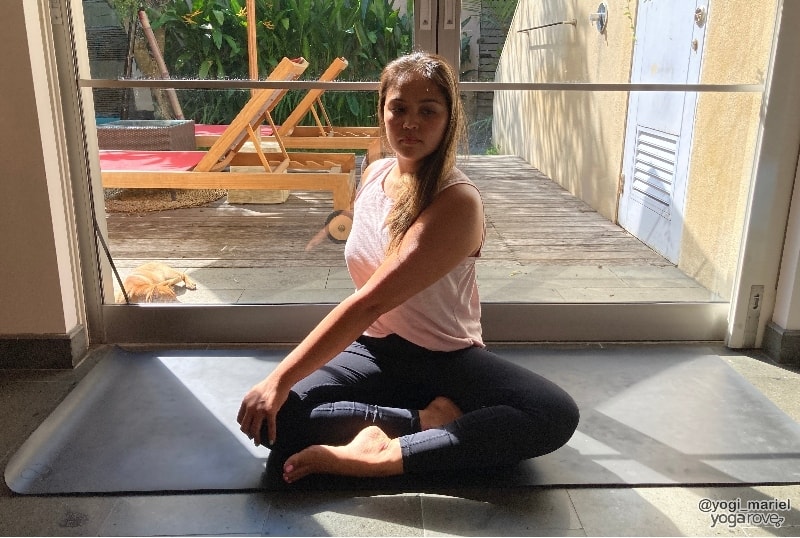
Warm-Up
Many people tend to skip warmups when they work out, and instead go straight into the practice or routine. Not only does skipping your warmup increase the risk of injury, but it also leads to sore muscles. Before you move into your workout, include a 10-15 minute warmup before any physical activity. A well-trained yoga teacher will always include a warm-up as part of your yoga practice, but if you are practicing at home and on your own, don’t forget to include a few cat/cows, child’s pose, and other warm-up yoga postures.
Cool Down
Always remember to stretch after a workout to lengthen and loosen muscles that might have cramped up during your workout. Sometimes you may be too exhausted to do a few extra stretches at the end of your workout, but this can make all the difference with how you will feel the next day. Set aside at least 5 minutes for some post-workout stretches.
Pay Attention to Alignment
If you practice with the incorrect alignment, you might create unnecessary muscle soreness by straining different muscles or overcompensating by using the wrong muscles. Listen to your teacher’s cues in each posture, and work on finding the proper alignment. If you’re unsure about alignment in a pose, you can always ask your teacher after your class.
Hydrate
Hydration not only after, but during your workout or practice is extremely important. This is especially true if you are practicing a more intense style of yoga where you sweat more such as Hot yoga or Power yoga. Take a sip of water whenever you need it.
Listen to Your Body
If something feels off during your practice, try to stop and listen to your body before continuing. If you feel like you are pushing your body to get into a certain shape or overstretching, back off and find a space that feels comfortable. Use your breath to stabilize your physical body and never push yourself.
Related questions
Can yoga help you lose weight? Depending on what style of yoga and how frequently you are practicing, yes, yoga can help you lose weight. If your focus is weight loss, try styles like Vinyasa yoga, Power yoga, or Ashtanga yoga, and don’t forget to adopt a healthy lifestyle and eating habits.
How often should I do yoga for the best results? A consistent practice a few times a week is better than an inconsistent practice once a week. See if you can work in a few minutes of yoga 3-5 times per week to see results in your mind and your body.

